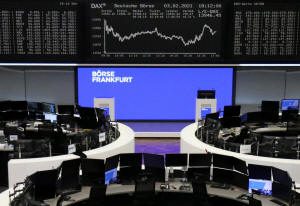Oil on the boil, stocks and bonds toil
 Send a link to a friend
Send a link to a friend
 [February 04, 2021]
By Marc Jones [February 04, 2021]
By Marc Jones
LONDON (Reuters) - World stock markets were
fighting for a fourth day of gains on Thursday as a near one-year high
in oil prices, a revitalised dollar and rising bond yields refocused
attention on inflation and normalising economies.
With the WallStreetBets/Reddit retail trading tumult having eased this
week, markets were back in their comfort zone of corporate earnings,
economic data and central bank meetings.
Oil was approaching $60 a barrel after OPEC and its allies extended
production cuts [O/R]. London, Frankfurt and Paris share indexes edged
0.1%-0.5% higher, helped by more German stimulus [.EU] and as the
dollar's renewed swagger shoved the euro back under $1.20. [/FRX]
Britain's sterling also saw its biggest fall in three weeks as traders
waited to see whether the Bank of England would formally endorse
negative interest rates as a potential future option.
At the end of last year, expectations were building that their
introduction could be imminent. But Britain's speedy COVID-19 vaccine
rollout since then has eased those bets.

"The BoE will maintain a quite cautious tone," said Silvia Dall'Angelo,
a senior economist at fund management firm Federated Hermes, adding it
was likely that the bank would talk about negative rates. "But at this
stage there is very little appetite to use this measure."
Hopes that the COVID pandemic can be brought to heel by extensive
vaccination programmes, combined with expectations of unswerving global
economic stimulus, has begun to see bond market focus returning to
rising debt and possible inflation.
Germany’s 30-year government bond yield on Thursday was almost back in
positive territory for the first time since September. The gap between
two- and 10-year U.S. Treasury yields at more than 100 basis points is
now the widest in almost three years.
New U.S. President Joe Biden had told House Democrats on Wednesday he
was more concerned that too little would be provided rather than too
much when it came to economic relief.
GOOGLE IT
U.S. stock futures were up in Europe. Wall Street had seen the NYSE
Fang+ index of leading tech giants hit an intraday record high on
Wednesday, thanks to a 7.4% gain in Google parent Alphabet following its
strong earnings.
But markets had been softer in Asia overnight. MSCI's ex-Japan
Asian-Pacific index fell 0.6%, led by 1.3% and 0.4% drops in South Korea
and China. Japan's Nikkei lost 1% as it ended a three-day winning
streak.
[to top of second column]
|

The German share price index DAX graph is pictured at the stock
exchange in Frankfurt, Germany, February 3, 2021. REUTERS/Staff

Rising Chinese short-term interest rates kept risk appetite low,
though analysts also noted position adjustments before the Lunar New
Year starting next week are likely to play a role too.
Higher interest rates have raised worries that Chinese policymakers
may be starting to shift to a tighter stance to rein in share prices
and property markets.
"There's persistent speculation that the Chinese authorities may
want to tighten its policy," said Wang Shenshen, senior strategist
at Mizuho Securities.
Markets on the whole have calmed in the past few days with the Cboe
Volatility index slipping to its lowest levels in over a week.
As the retail trading frenzy seen last week faded, stock prices of
GameStop and other social media favourites have steadied, although
cryptocurrency Ethereum has been on a tear ahead of the introduction
of futures contracts next week.
Among the mainstream currencies, the dollar hit a near-three-month
high versus the Japanese yen of 105.19.
The euro lost 0.4% to $1.1989, having already hit a two-month low
overnight.
The single currency had failed to capitalise on improved sentiment
in Italy after former European Central Bank chief Mario Draghi
accepted the task of trying to form a new government in the country.
Gold fell 1% to $1,810 per ounce though oil continued to advance
after the OPEC+ alliance of major producers stuck to a reduced
output policy and U.S. crude stockpiles fell to their lowest since
March last year.
U.S. crude rose 0.8% to $56.14 per barrel and Brent gained 0.6% to
$58.89. Both stood near their highest levels in about a year.
"OPEC have come in and said they are looking to remove the supply
but the main driver is markets are starting to price in demand
recovery, especially from emerging markets," said Legal & General
Investment Management's Justin Onuekwusi.
(Reporting by Marc Jones, editing by Larry King)
[© 2021 Thomson Reuters. All rights
reserved.] Copyright 2021 Reuters. All rights reserved. This material may not be published,
broadcast, rewritten or redistributed.
Thompson Reuters is solely responsible for this content. |